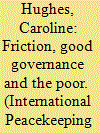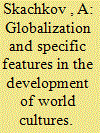| Srl | Item |
| 1 |
ID:
123991


|
|
|
|
|
| Publication |
2013.
|
| Summary/Abstract |
Friction is a zone of contingency where creative responses of local and international agents produce unexpected effects. Viewing 'good governance' in this light allows better appreciation of the blurring of boundaries between international prescriptions and local cultures, often regarded as antithetical in the Cambodian case. In fact, actors in Cambodia mobilize both a newly invigorated domestic cultural discourse and international ways of working to pursue struggles over development in the post-conflict context. However, elite actors are much better placed to do this successfully than are the poor.
|
|
|
|
|
|
|
|
|
|
|
|
|
|
|
|
| 2 |
ID:
139732


|
|
|
|
|
| Summary/Abstract |
FEW PEOPLE would presently question self-importance of a cultural factor in world politics. One could easily agree with the British political scientist A. Hopkins who held that culture has always been impacting global processes, despite the fact that researchers have long been giving preference to politics and the economy over culture when evaluating global phenomena.
|
|
|
|
|
|
|
|
|
|
|
|
|
|
|
|
| 3 |
ID:
189311


|
|
|
|
|
| Summary/Abstract |
The official list of ethnic groups of the People's Republic of China, begun in the 1950s and completed in 1979, included and still includes 56 groups speaking a total of 54 languages. Extensive field research in recent years has shown that the ethnic and linguistic picture of the country is in fact much more complex and diverse than had been imagined until the late 1970s. China remains one of the most linguistically diverse countries in the world, but many minority languages and varieties of Chinese dialects, both previously known and newly discovered, are now spoken only by a few thousand, a few dozen, or even a handful of older locals. The most important task set by the Chinese state for linguists is to further study, with electronic preservation, the numerous languages of minority ethnic groups, any Chinese dialects, and, more recently, samples of local spiritual and material culture. From 2015 to 2019, an ambitious China Language Resource Preservation Program was implemented. The materials collected during field research, including those on endangered language varieties, have been presented in numerous publications and used to create a unique online platform available to linguists and partially to ordinary Internet users. The next phase of the study and preservation of China's linguistic and cultural heritage was initiated by the government in 2020. A document devoted entirely to language problems and language policy was published by the Office of the State Council of the People's Republic of China in 2021.
|
|
|
|
|
|
|
|
|
|
|
|
|
|
|
|
| 4 |
ID:
100017


|
|
|
|
|
| Publication |
2010.
|
| Summary/Abstract |
Peacebuilding without cultural sensitivity is empty; cultural sensitivity without cosmopolitan values is blind. Sustainability considerations require that peacebuilding approaches are locally accepted, and this local acceptance depends not least on the degree to which these approaches are commensurate with local understandings and cultural practices. The problem with the recommendation of focusing on local cultures, however, is that these practices are neither monolithic nor necessarily compatible with the aim of working towards less violent societies. Some value basis is therefore inevitable. Essentially, peacebuilding agendas need to start with fostering mutual recognition among former adversaries. On the basis of mutual recognition and on the grounds of values such as equality and compassion as framework principles, more detailed guidelines for political and socioeconomic rearrangements can be negotiated, while ideals of discourse ethics partially entail and partially supplement this value ground.
|
|
|
|
|
|
|
|
|
|
|
|
|
|
|
|